Metal Partial Denture: A Durable and Comfortable Tooth Replacement Option
If you’re missing one or more teeth and looking for a long-lasting, natural-looking solution, a metal partial denture might be the perfect choice. Known for its strength, fit, and aesthetic appeal, this type of dental prosthesis is widely recommended by dentists for patients who want to restore their smile without compromising comfort or durability.
What Is a Metal Partial Denture?
A metal partial denture is a removable dental prosthesis designed to replace one or more missing teeth. Unlike full dentures, it works alongside your existing teeth, using a strong metal framework—typically cobalt-chrome—to hold artificial teeth in place.
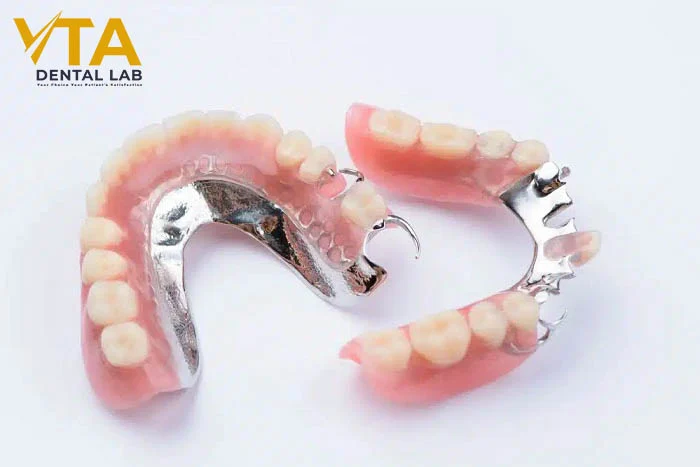
Metal partial denture with custom-fit cobalt-chrome framework for unmatched comfort
The main components of a metal partial denture include:
- Metal Framework: Made from cobalt-chromium, providing the strength and structure needed for daily function.
- Acrylic or Resin Teeth and Gums: Designed to replicate the look of natural teeth and gum tissue.
- Clasps and Connectors: Secure the denture to your remaining teeth, adding stability during chewing or speaking.
Who Is a Good Candidate for Metal Partial Dentures?
Metal partial dentures are ideal for patients who:
- Have several missing teeth but still retain some healthy natural teeth.
- You are looking for a long-term, reliable solution.
- Prefer a prosthesis that is both functional and aesthetic.
Because they help preserve natural teeth and prevent jawbone shrinkage, metal partial dentures are often recommended over full dentures in cases where tooth loss is partial.
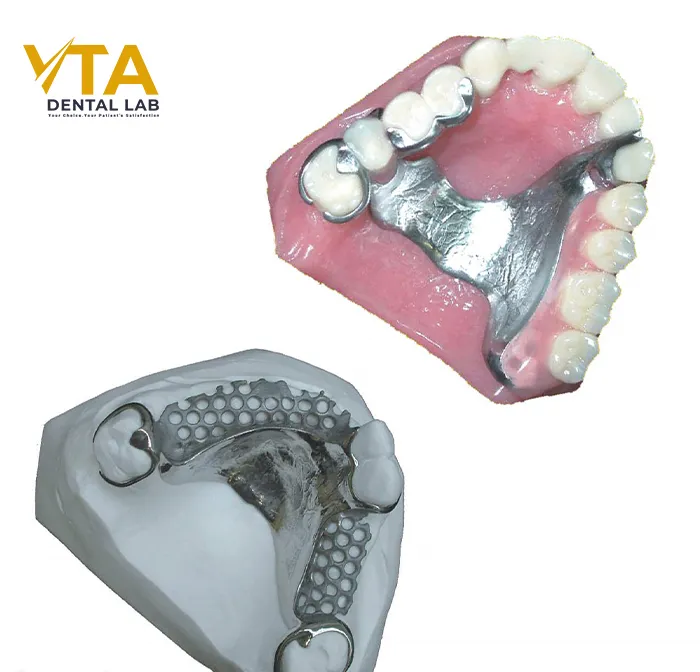
Built with high-quality metal for lasting strength and stability
The benefits of a metal partial denture
Durability and Long-Lasting Performance: The metal framework, typically made from cobalt-chromium alloys, provides exceptional strength and resilience. This ensures that the denture can withstand daily wear and tear, offering a long-lasting solution.
Better Fit and Stability: The metal structure allows for a precise fit, reducing the likelihood of the denture slipping or causing discomfort. This stability is crucial for effective chewing and speaking.
Aesthetic Advantages: Metal partial dentures are designed to blend seamlessly with natural teeth. The metal clasps and connectors are often discreet, ensuring that the denture remains unobtrusive and aesthetically pleasing.
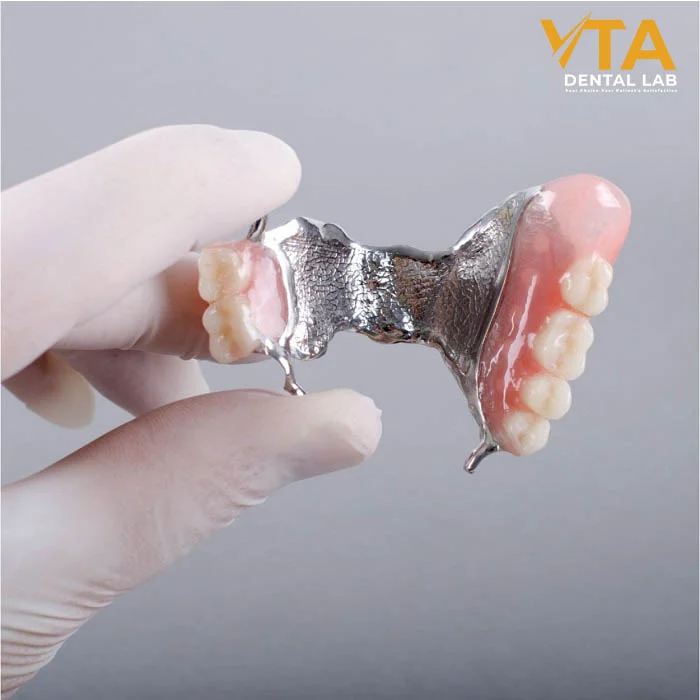
Designed to blend with your natural teeth while restoring full function
Potential risks of a metal partial denture
While a metal partial denture offers numerous benefits, it’s essential to consider the potential risks associated with it to make an informed decision.
The patients may experience discomfort, soreness, or irritation in the gums and soft tissues. This occurs as the mouth adjusts to the presence of the metal framework and clasps.
Some patients may develop allergic reactions to the metals used in the denture framework, such as cobalt chrome or nickel.
While metal partial dentures are designed to be discreet, some metal clasps may be visible when smiling, particularly on front teeth.
Over time, natural teeth and gums can shift, causing the denture to fit improperly or loosen.
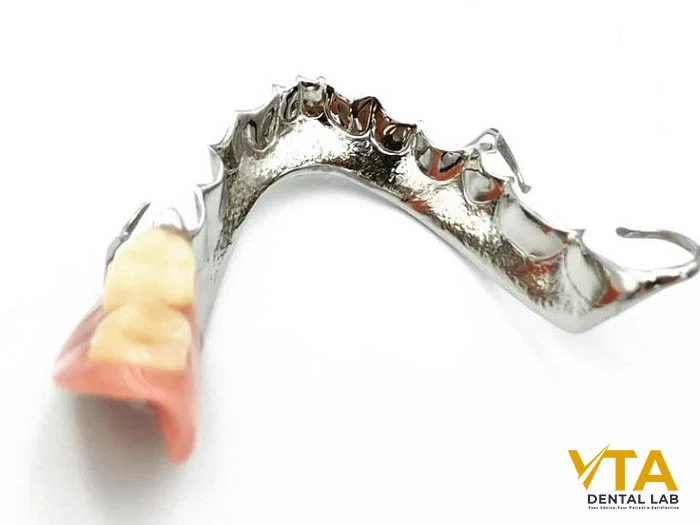
Metal partial dentures that look and feel like your own teeth
Metal Partial Dentures vs. Acrylic Partial Dentures
The differences between metal and acrylic partial dentures are clear. Metal dentures are more durable and provide a better fit, making them ideal for long-term use. While acrylic partials may be more affordable upfront, they are less durable and may require frequent repairs or replacements. Metal partial dentures also tend to be more comfortable due to their lightweight framework, whereas acrylic partials can feel bulky and less stable.
Material and Durability
A metal partial denture is constructed with a cobalt-chrome framework, a material highly regarded for its strength and long-lasting performance
An acrylic partial denture is made from acrylic resin, which is lighter and more affordable. However, their durability is not as high as metal dentures, making them more prone to cracks or damage over time, especially with heavy usage.
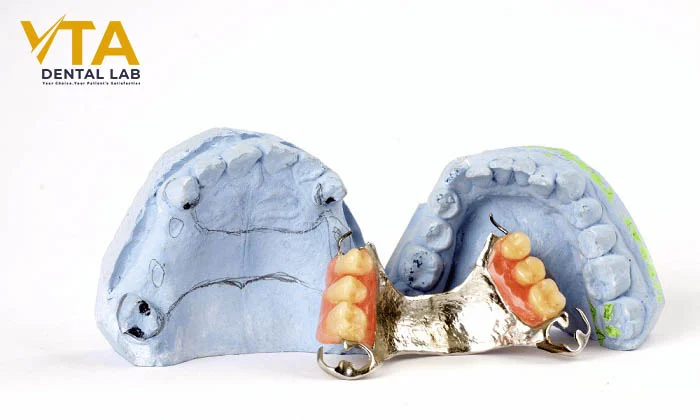
Metal frameworks provide stability, while acrylics may shift over time
Fit and Comfort
A metal partial denture thinner framework, reducing bulk, making it more comfortable for daily wear
Acrylic partial dentures are often thicker and bulkier, which can cause initial discomfort. While they are easier to adjust, they may not feel as stable as their metal counterparts, especially during chewing or speaking.
Aesthetic Appeal
Metal partial dentures often feature metal clasps that can sometimes be visible when smiling. However, these can be replaced with tooth-colored or clear clasps for a more natural look.
Acrylic partial dentures can be crafted to closely mimic the color of natural teeth and gums, providing a more discreet appearance. This makes them a preferred option for those prioritizing aesthetics.
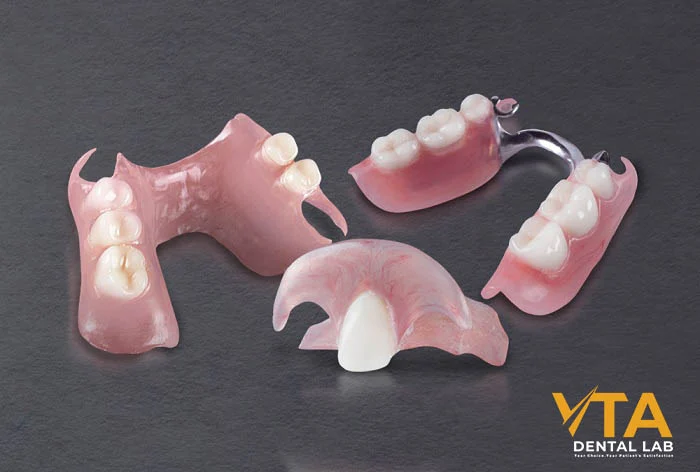
Metal partial dentures outperform acrylic in comfort and resilience
Overall, metal partial dentures are preferred for their strength, fit, and long-term value, while acrylic dentures might suit those prioritizing affordability or short-term use.
Looking for a Dental Lab to Make Cast Metal Partials?
A metal partial denture is widely considered the best removable option for replacing missing teeth, especially for those who value durability and comfort. These dentures are fabricated in professional dental laboratories by experienced technicians who specialise in cast metal frameworks. With high-quality materials and a tailored design process, the result is a reliable prosthesis that supports oral health and restores natural function.
At VTA Dental Lab, we bring together digital precision and artisanal craftsmanship to deliver high-quality cast metal partials. Trusted by clinicians, our team is committed to consistency, accuracy, and patient satisfaction in every case.